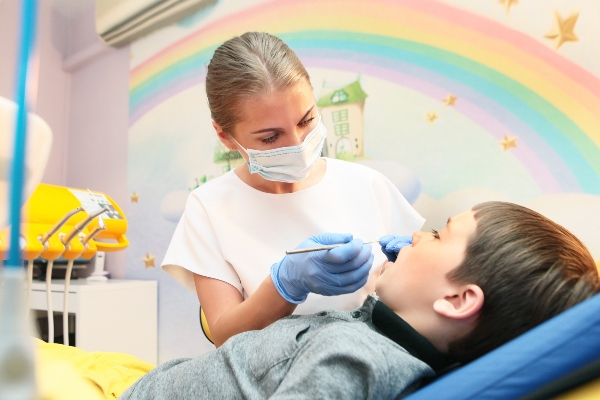Seeing a Pediatric Dentist in Richmond for Retained Thumb-Sucking Habit

A pediatric dentist monitors the development of a child’s teeth and jaw. This can involve making sure that the teeth erupt at the right time and helping parents to ensure that their child grows up to have healthy, problem-free teeth.
One challenge to a child’s dental health is thumb-sucking that persists long after infancy. If left unchecked, this habit can change the bite of the child, often by creating an overbite. Ultimately, prolonged thumb-sucking can alter the appearance of a child’s face and make the teeth harder to clean.
When exactly does thumb-sucking become something to worry about? In addition, how can parents work with a pediatric dentist to deal with the habit?
Seeing a pediatric dentist for thumb sucking
Many children suck their thumbs. A child may even start sucking the thumb in the womb. This trait is perfectly normal during the first few years of a child’s life.
During this time, the child sucks the thumb to self-soothe or stimulate the brain. A parent may notice that a baby sucks the thumb while falling asleep. Parents may also observe this behavior when the child is bored or anxious. However, as the child gets older and this habit continues, parents as well as the child's dentist may start to worry.
When should a parent start to worry?
Usually, a child will grow out of the thumb-sucking habit. Most children stop well before turning five. If the child continues to suck the thumb through pre-school, then parents should consider enlisting the help of a pediatric dentist.
Parents should also be concerned if the child sucks the thumb in a way that affects the growth of the teeth. This is why parents should keep a close eye on children's mouths and notice whether a toddler is applying pressure to the teeth while sucking.
If the child continues to push against the teeth and gums with the thumb, there is a risk of developing an overbite, an open bite, jaw deformity, jaw pain or poorly erupted teeth. When a parent notices that a child’s thumb-sucking has become destructive, it is time to get help for the habit.
Tips from a pediatric dentist
There is no magic spell to get a child to quit sucking the thumb, the tongue or a pacifier. Each child will need a tailor-made approach to get rid of the habit for good. That said, there are some general strategies that work for many kids, most of the time.
1. Get the child involved
Let the child be an active participant in the process. Start by explaining why they should quit the habit. Next, make a calendar-chart that shows the child’s progress. The kid gets to place a star on the chart for each day that passes without sucking the thumb. This visual can motivate the child and clearly show the results for efforts and the goal to be achieved.
2. Provide positive reinforcement
The chart can play an important role in this. It gives the child a clear end goal, giving motivation to get as many stars as possible onto that chart. Praise a child for doing well and reinforce progress with the occasional treat or gift when milestones are reached.
When the child ‘falls off the wagon’ as it were, avoid punishment. A negative reaction from the parent can demotivate a child.
3. Deal with any triggers that cause thumb-sucking
Thumb-sucking can be a way for a child to deal with boredom or anxiety. A parent should teach the child to deal with such triggers in a different way. When possible, the parent should get rid of the trigger altogether.
4. Help the child during sleep
A child naturally has less self-control while asleep. Wrap the thumb in a bandage or put a sock over the whole hand to discourage nighttime sucking.
Talk to a pediatric dentist about your child’s oral health
A pediatric dentist can help parents navigate the different challenges to their children’s oral health. Get in touch with a kid's dentist to learn tips and advice for dealing with thumb sucking among other common issues.
Request an appointment here: https://www.grandparkwaypediatricdental.com or call Grand Parkway Pediatric Dental at (832) 579-0960 for an appointment in our Richmond office.
Check out what others are saying about our services on Yelp: Read our Yelp reviews.
Recent Posts
Many children fear going to the dentist. However, a kid's dentist can transform these essential dental visits into a fun and educational experience. Through their specialized training, these dental professionals create an environment that can help alleviate fear around dental care and promote positive dental experiences for young patients.When children step into a kid's dentist's…
A child’s visit to the kids dentist does not have to be a point of contention. Many children grow to look forward to their dental appointments if they go to pediatric dentists who focus on kids because their offices are often entirely different from those that more broadly treat adults.Since children need to go to…
Seeking the help of a kids dentist to maintain your child’s oral health is a serious responsibility. As a parent, you must ensure that your child’s dentist will be able to care for your child’s general well-being. Knowing what your dentist can do for your child is a motivator to bring your child in for…
Finding the right kids dentist is important for protecting your child's oral health future. In addition to finding a skilled pediatric dentist who can build a solid rapport with your child, the location and convenience are also important. We hope this simple guide to finding a kids dentist near you simplifies your search.A kids dentist…


